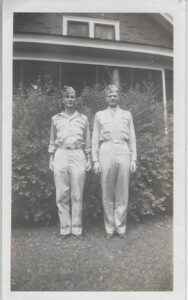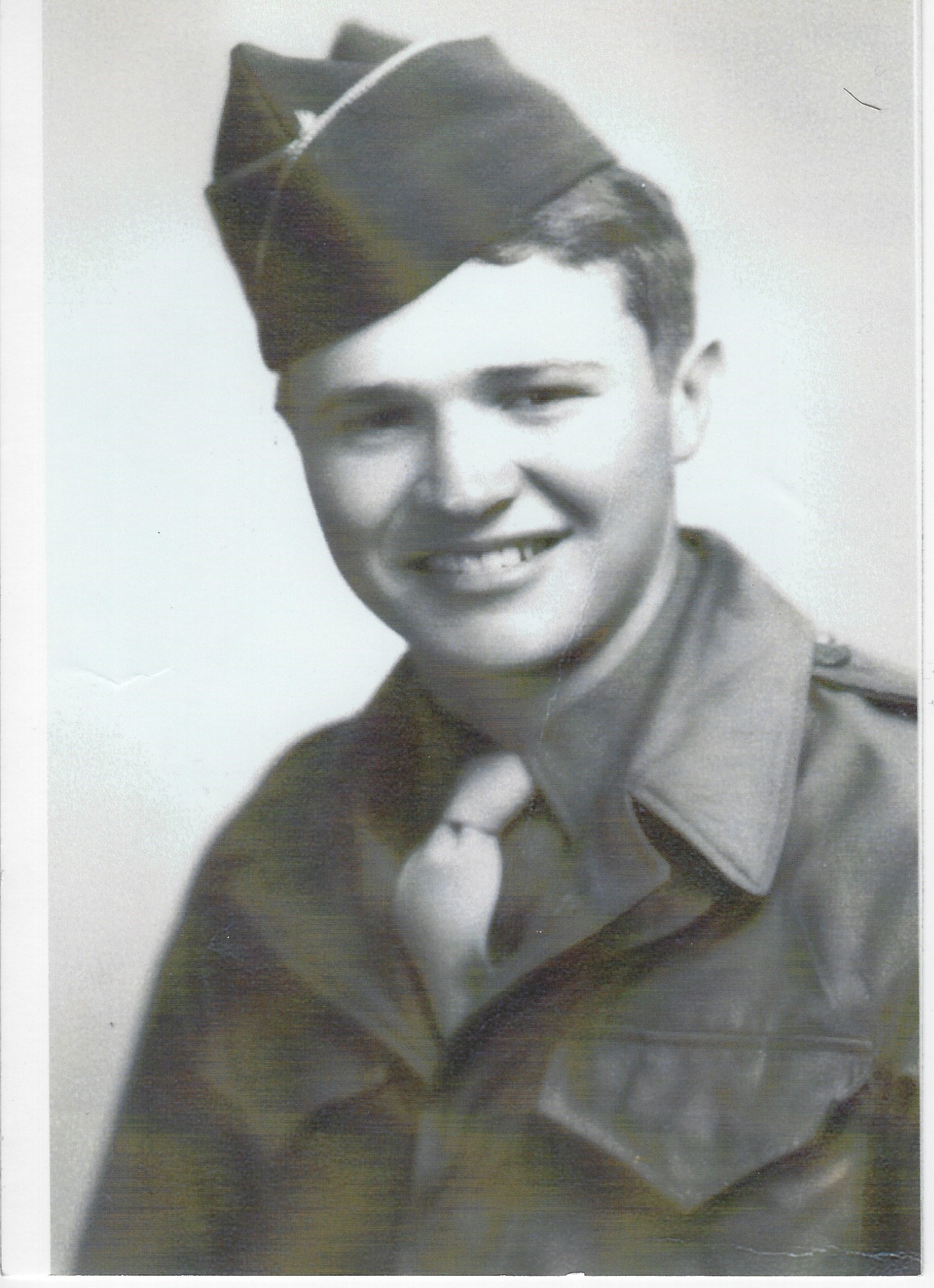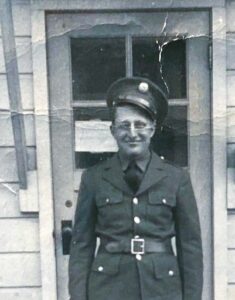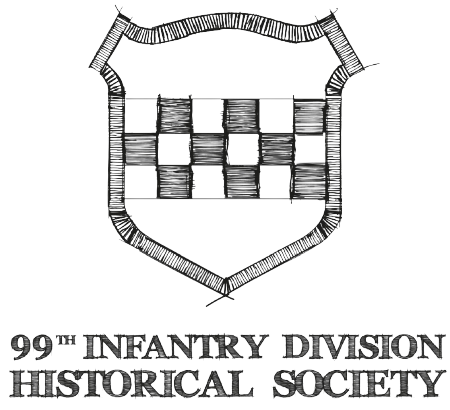394th Infantry Regiment Co. A, first platoon
 This is my Dad’s story. His World War II story. Also, this is my story and our family’s story. As his story unravels it also becomes an important influence on our family.
This is my Dad’s story. His World War II story. Also, this is my story and our family’s story. As his story unravels it also becomes an important influence on our family.
My Dad, Wendell Clark, graduated from New Providence High School in the spring of 1942 at the age of sixteen. That’s the way country school worked back then. He enlisted in the Army in the fall of 1943 since his Dad, my Grandpa, went to go with him to enlist since he was not yet eighteen.
I asked him, “Why did you want to enlist so quick and so young?”
He replied with a grin, “I guess I was going to save the world.” That is what the Greatest Generation did.He reported to basic training in March of 1944. After basic training he went to Camp Maxey for additional training and then was sent to England in September of 1944.
He became a member of the 99th Division, First Platoon, Company A, where they were positioned on the Belgium and Germany border. It was called an “inactive” front or “country club” kind of duty, supposedly.
When Dad told his war story, he mentioned the weather was exceptionally cold that winter, and that was part of God’s plan.
He spent lots of time in a foxhole in a wooded area. Unfortunately, the Army didn’t supply winter clothes for the bitter cold winter starting in 1944. He changed socks daily and kept one pair kept under his shirt to keep his extra pair dry and warm. There was a lot of discussion and debate on the difference between frost bite and trench foot. Whatever, he was sent to a hospital in England before Thanksgiving to recover from frost bitten feet. Frost bite caused Dad to miss the main surge of the Battle of the Bulge. The 99th lost one-third of the 15,000 troops. Dad’s platoon lost over half he served with were KIA, MIA or captured. After healing from frost bitten feet, he left England and joined his unit the battle at Elsenborn Ridge January 3rd, 1945.
The 99th battled on to the bridge at Remagen that was taken on March 7th. Dad proudly told that the 99th was the first complete unit cross the Remagen Bridge on March 9th or 10th. After continued pounding from enemy bombing attempts, ground and air attacks, the bridge collapsed in on March 17th. Dad ran across the railroad bridge, dodging the holes in the walkway and avoiding enemy bullets. He ran in to the darkness of the tunnel at the end of the bridge and rested to catch his breath against a pile of, what appeared to be, cord wood. As his eyes accustomed to the darkness, he realized he leaned against a pile of frozen corpses. Quite an experience for a Hardin County farm boy. On moving along through villages, they came to Honnigen, Germany on the morning of March 15th. They were told to not expect much resistance and prepared to assembly the villagers in various buildings or courtyards. As a nineteen-year-old squad leader, due to the many MIA and KIA’s, he moved down a hill outside of the village at before noon on March 16th.
A sniper positioned in a castle outside of the town shot Dad in the right leg. He laid on the cold ground pretending to be dead. The sniper continued to take shots, hitting him in the boot missing his toes and another shot took off his ammunition belt. That’s when he thought the sniper was getting too close so he got up and ran to get behind a tree in the nearby woods. As he ran to the woods another bullet hit him in the left leg. God provided protection with a sniper that was not a talented rifleman and very cold winter weather. While he waited, he visited with another solider hiding behind a nearby tree and discovered he was from Iowa Falls, Iowa- a neighbouring town. It can be a small world. Reinforcements and rescue came after 5 PM the next day, thirty hours later. No medics for treatments were possible. Dad spent the rest of the war recuperating in hospitals in England and Colorado.
Dad was asked over forty years ago about his experience, wounded and waited outside of Honnigen, Germany.
He was asked “Did you pray?”
He quickly answered “All the time.”
Over the years, that short answer to that short question has really stuck in my mind. He prayed all the time. He carried a small pocket New Testament with him all through the war. So, was the time on a hill outside of Honnigen, Germany, bleeding, waiting and praying for thirty hours, a life changing experience? Did that long talk with God mold him in to the man he became? Did coming back to Hardin County Iowa, becoming a loving husband, caring father, hardworking farmer, community volunteer that guided by his saving faith showing God’s love and peace? Did that also was brought our family to a saving faith that will lead us to a heavenly family reunion? The Bible shows how the Lord takes care of His people in Romans.
And we know that for those who love God all things work together for good, for those who are called according to his purpose. Romans 8:28 ESV
I would have liked to have played catch with my Dad like they did in “Field of Dreams”. Would it be interesting and insightful to ask Dad what his experiences he learned from his time in Belgium and Germany? Wouldn’t there be lots of questions to talk to my Dad while we would be playing catch when he knew me as a younger man? Was it that a long talk with the Lord while bleeding from two gunshot wounds on a cold hill in Germany made him a changed man? Was it then that he developed an understanding of God’s love moved him to a stronger faith in the Lord’s saving grace made him a changed man? Was it that time in prayer that made his faith stronger and guided him to become a man that loved his family and committed himself to his community and taught him the value of hard work?
Most members of the Greatest Generation would not talk much about their war experiences. Those memories would be buried in their minds until forty to forty-five years later. Those memories included praying on a cold hill in Germany talking to God about how his life will be changed when he comes back to Iowa.
All of the details of my Dad’s story about freezing in a foxhole, running across the bridge in Remagen and being shot by a sniper on a cold day on a hill don’t seem significant compared to praying all of the time.
It’s been said that there are no atheists in foxholes. That was certainly the case with my dad. Dad prayed all the time. His praying didn’t stay in the foxhole, but accompanied him as he crossed the bridge at Remagen and as he lay shot pretending to be dead. Dad prayed as he dodged the sniper’s bullets retreating to the woods and waiting thirty hours for help. But most importantly, the faith that moved my dad to pray didn’t stop when the war was over. He brought back to Iowa the trust in God. He remained a man of prayer. He raised his family to pray, worship and serve.
Of all the lessons I’ve learned from my dad over the years, the simplest and most important one is to pray all the time. Thank you, Dad.
Source: Son of Wendell Clark



